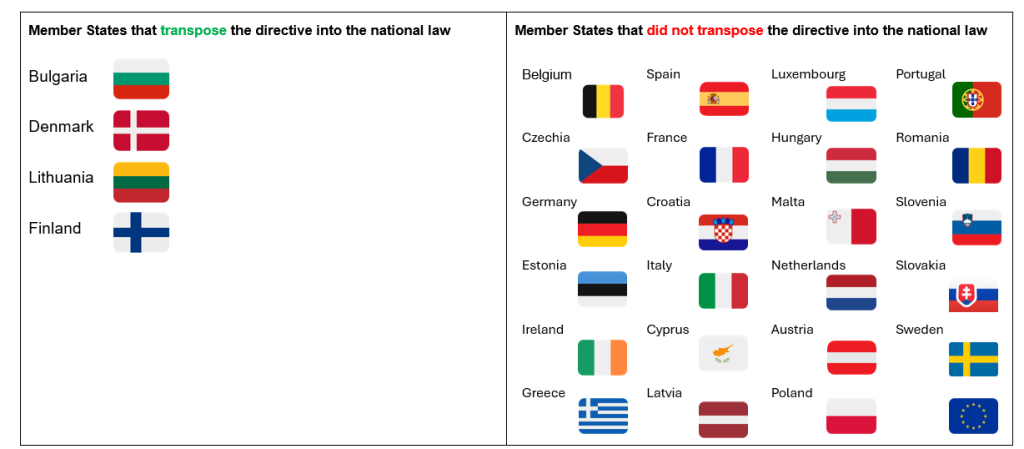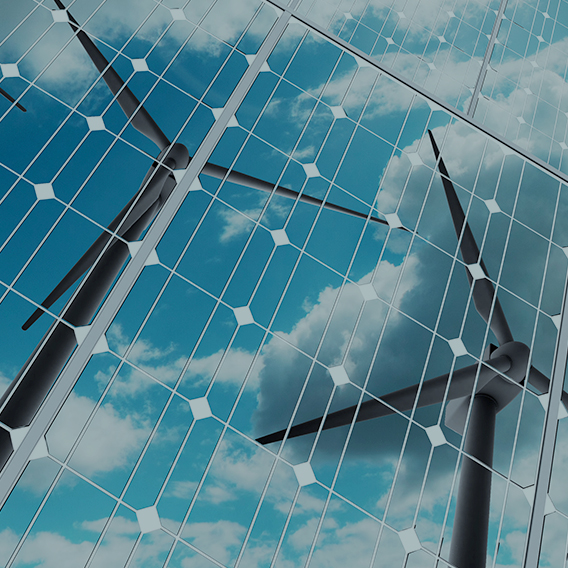On 11 September 2024, the European Commission published the State of the Energy Union report which describes how the EU has managed unprecedented challenges in the energy policy landscape during this Commission's mandate, equipping the EU with a regulatory framework for pursuing the clean energy transition and laying the foundations for renewed economic growth and competitiveness.
Key legislative updates in the EU energy sector
The European Union has recently taken significant steps in its energy legislation to support its climate neutrality objectives for 2050 and emission reduction targets for 2030. The following legislative measures have been introduced or entered into force:
- Renewable Energy Directive (RED): Enhancements to the RED focus on increasing the share of renewable energy sources, streamlining permitting processes, and integrating renewables into the EU energy grid
- Energy Efficiency Directive (EED): Stricter requirements for energy consumption reduction across member states, promoting sustainable practices and efficient use of energy.
- Energy Performance of Buildings Directive (EPBD): Mandates to improve energy efficiency in the building sector, with targets for new constructions and renovations.
- Hydrogen and Decarbonised Gas Markets Package: Comprehensive regulations to facilitate the adoption of hydrogen and other low-carbon gases.
- Methane Emissions Regulation: A groundbreaking regulation to monitor and reduce methane emissions in the energy sector.
- Electricity Market Design Reform (in detail on pages 6-7): Aims to create a more resilient and consumer friendly energy market while ensuring security of supply.
Extension of the Emissions Trading System (ETS): Inclusion of new sectors and tightened caps to strengthen the EU’s carbon pricing mechanism.
Achievements in 2024:
- Record Renewable Installations: In 2023, the EU installed 56 GW of new solar capacity, with renewables accounting for 50% of electricity generation in the first half of 2024.
- Reduced Dependency on Russian Energy: Imports of Russian gas have fallen from 45% of total EU imports in 2021 to 18% by mid-2024. Similar reductions have been achieved for coal and oil imports.
- Progress in Energy Security: Gas storage reached a record 90% capacity by mid-August 2024, ensuring resilience for winter energy demands.
Key Achievements Under the Fit-for-55 and REPowerEU Plans:
- Energy Efficiency Gains: Primary energy consumption has declined, moving closer to the 2030 targets.
- Decarbonisation Milestones: The EU’s greenhouse gas emissions are 32.5% lower than 1990 levels, and the Emissions Trading System (ETS) has expanded to include maritime transport.
- Renewable Energy Expansion: Wind and solar energy installations have surged, with wind surpassing gas generation as the second largest electricity source after nuclear.
- Diversification of Energy Imports: Norway and the U.S. have become the EU’s largest suppliers of pipeline and LNG gas, respectively, replacing Russian imports.
- Support for Clean Energy Technologies: Initiatives like the European Solar PV Industry Alliance and the European Industrial Alliance on Small Modular Reactors (SMRs) have been launched to strengthen the clean energy sector.
Economic and Employment Benefits
- Job Creation: REPowerEU targets are projected to create over 3.5 million jobs by 2030, emphasizing the economic opportunities in the energy transition.
- Competitiveness: The Net-Zero Industry Act and Critical Raw Materials Act aim to ensure resilient supply chains and support for European manufacturers in the global clean energy market.
Challenges and Future Steps
- Addressing Ambition Gaps: More robust measures are required to meet the 2030 renewable energy and efficiency targets.
- Energy Poverty: Tackling high energy costs remains a priority, with targeted interventions to shield vulnerable populations.
- Grid Modernization: The Grids Action Plan addresses challenges in expanding and digitalizing electricity infrastructure across the EU.
EU Initiatives to Watch
- European Hydrogen Bank: Supporting hydrogen investments and market development with new auctions and funding mechanisms.
- Aggregate EU Platform: A permanent tool for joint purchasing of natural gas and strategic commodities, enhancing energy security.
- European Net-Zero Academies: Providing workforce training in renewable energy, hydrogen, and other key sectors.
- Expansion of LNG Infrastructure: New terminals and expansion projects have increased the EU’s LNG import capacity, improving energy security.
- European Renewable Energy Auctions Platform: A new platform to consolidate information on planned renewable energy auctions across the EU, streamlining investments in the sector.
17 January was the deadline for EU member states to transpose the new electricity market design rules into national law. These rules have been created to tackle rising energy prices. They aim to make energy prices more stable and predictable for consumers and less dependent on the price of fossil fuels.
Member States were required to take national measures to:
- Energy costs which are more reflective of (cheaper) renewable energy and also more predictable.
- Wider choice of consumer contracts and clearer information before signing contracts.
- Option to lock in secure, long-term prices.
- Dynamic pricing contracts, if needed, to take advantage of price variability to use electricity when it is cheaper.
- Protection from being without electricity through the establishment of suppliers of last resort.
- Protection from disconnection for those who are vulnerable or energy poor.
- More opportunities for energy sharing, for example, tenants will be able to share surplus rooftop solar power with a neighbour.
According to EUR-Lex, the vast majority of EU member states have failed to transpose the New Market Design Directive into national law.

On 23 January during the World economic forum in Davos a new Global Energy transition Forum was launched by European Commission President Ursula von der Leyen along with international partners with the objective of reaching for ambitious climate targets at world level and supporting countries for whom the clean transition is more challenging.
- The forum aims to:
- Maintain momentum on global energy agreements and integrate these targets into new Nationally Determined Contributions (NDCs) ahead of the COP.
- Transform these targets into concrete projects that benefit people, such as bringing power to underserved communities and scaling up clean energy globally.
- Unlock more investment through smart finance, de-risking tools, blended finance, and other creative solutions to attract private capital.
- President von der Leyen highlighted the unprecedented levels of world spending on clean energy. “Last year alone, global spending on clean energy hit a record USD 2 trillion. For every dollar invested in fossil fuels, you had two dollars invested in renewable energy. In the power sector, clean energy investments outnumber fossil fuels ten to one. This is a shift we have been working towards for years,” she remarked.
- Challenges: Despite progress, regions like Africa still struggle to benefit from the clean energy transition, receiving only 2% of clean energy investment despite having 60% of the world’s best solar resources.
- Scaling Up Manufacturing: The forum also focuses on scaling up manufacturing to improve grids and storage capacity, requiring massive investment that no single company or country can undertake alone.
- The President concluded saying: “I want to be very clear with my message: Europe stays the course and we stand ready to work with all global actors to accelerate the transition to clean energy.”
The European Commission has published a new study that provides an in-depth look at the state of net-zero technology manufacturing across the EU. The study highlights advancements in key sectors such as wind, solar, batteries, carbon capture, and heat pumps. It aims to fill data gaps and offer a reliable assessment of the manufacturing capacities for these technologies in all 27 EU countries.
Key findings include:
- 1. Manufacturing Capacity: A detailed mapping of the current manufacturing capabilities for net-zero technologies in each EU country.
- 2. Policies and Incentives: Analysis of the national policies and incentives that support the growth of manufacturing capacities. This includes regulatory frameworks, investment incentives, and skills development programs.
- 3. Challenges and Opportunities: Identification of bottlenecks in the manufacturing process and potential opportunities to increase production capacity.
- The study also highlights best practices in policy frameworks and notes that nearly three-quarters of EU countries have introduced incentive programs to boost investments in net-zero technology manufacturing. At the EU level, the Net-Zero Industry Act aims to enhance manufacturing capacity by addressing barriers to scaling up production in Europe.
- The report and its summary can be found here: The net-zero manufacturing industry landscape across the Member States European Commission.
The European Commission recognizes the importance of involving young people in policymaking processes and ensuring they are well-informed and actively participating in the energy transition.
- Youth Involvement: The European Commission aims to enhance youth participation in energy policy discussions, recognizing that 67% of young people see EU actions impacting their daily lives.
- Employment and Skills: The renewable energy sector is growing, with significant job opportunities expected. By 2030, 3.5 million new jobs will be needed, particularly in wind and photovoltaic sectors.
- Education and Awareness: The Commission is stepping up its efforts to provide information and tools for young people to get involved in the energy sector and to remove barriers such as lack of information and relevant curricula.
- Young Energy Ambassadors: Launched in 2023, this program selects 30 young people annually to promote engagement and awareness about EU energy policies.
- Educational Initiatives: The ‘Back to School’ initiative and e-learning content on the EU Academy website aim to educate students about energy, climate, and environment issues.
The Commission, the EU Agency for the Cooperation of Energy Regulators (ACER) and the Renewables Grid Initiative (RGI) have launched a survey on enhancing regulatory environments for stakeholder engagement in electricity infrastructure projects in the EU, under the EU’s Pact for Engagement. The survey will be open for 4 weeks, i.e. until 23 February 2025.
- Purpose: To understand practices, opportunities, challenges, and enabling conditions related to regulatory and legal frameworks of stakeholder engagement.
- Target Audience: Grid operators across Europe (TSOs and DSOs) and National Regulatory Authorities (NRAs).
- Outcome: Results will contribute to enhanced regulatory environments and will be presented at the 11th Energy Infrastructure Forum in June 2025 and at the Pact for Engagement Stakeholder Meetings.
- Survey link: EUSurvey – Survey.




